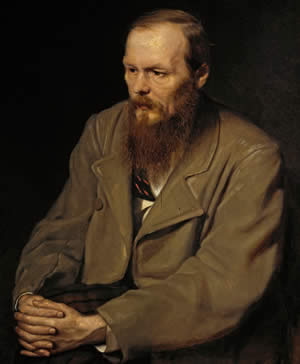One of the most dangerous Convicts
 Portrait of Dostoevsky
Portrait of Dostoevsky
In the mid-1840s Dostoevsky wrote his first novel, Poor Folk, which gained him entry into literary circles including Petrashevsky Circle. The Petrashevsky Circle was a Russian literary discussion group of progressive-minded intellectuals in St. Petersburg in the 1840s. Petrashevsky Circle was founded by Mikhail Petrashevsky, who had proposed social reforms in Russia. Nicholas I, the Emperor of Russia, alarmed at the prospect of the revolutions of 1848 spreading to Russia, saw great danger in organisations like the Petrashevsky Circle. In 1849, members of the Circle were arrested and imprisoned. The members were held in the well-defended Peter and Paul Fortress, which housed the most dangerous convicts.
They sentenced the members of the circle to death by firing squad, and the prisoners were taken to Semyonov Place in St Petersburg on 23 December 1849 where they were split into three-man groups. Dostoevsky was the third in the second row; next to him stood Pleshcheyev and Durov. The execution was stayed when a cart delivered a letter from the Emperor commuting the sentence.
It is belived that the Emperor had agreed to the lesser sentences, but gave explicit instructions that only after the entire ritual of preparation for execution had been completed should the prisoners be told that their lives had been spared by an act of imperial grace.
Dostoevsky served four years of exile with hard labour at a katorga prison camp in Omsk, Siberia, followed by a term of compulsory military service. After a fourteen-day sleigh ride, the prisoners reached Tobolsk, a prisoner way station. Despite the circumstances, Dostoevsky consoled the other prisoners, such as the Petrashevist Ivan Yastrzhembsky, who was surprised by Dostoevsky's kindness and eventually abandoned his decision to commit suicide. In Tobolsk, the members received food and clothes from the Decembrist women, as well as several copies of the New Testament with a ten-ruble banknote inside each copy. Dostoevsky described his barracks, as follows:
"In summer, intolerable closeness; in winter, unendurable cold. All the floors were rotten. Filth on the floors an inch thick; one could slip and fall ... We were packed like herrings in a barrel ... There was no room to turn around. From dusk to dawn it was impossible not to behave like pigs ... Fleas, lice, and black beetles by the bushel ..."
Classified as "one of the most dangerous convicts", Dostoevsky had his hands and feet shackled until his release. He was only permitted to read his New Testament Bible. The smell of the toilet pervaded the entire building, and the small bathroom had to suffice for more than 200 people. Dostoevsky was occasionally sent to the military hospital, where he read newspapers and Dickens novels. He was respected by most of the other prisoners, and despised by some because of his xenophobic statements.
Dostoevsky's literary works explore human psychology in the troubled political, social, and spiritual atmospheres of 19th-century Russia. His most acclaimed works include Crime and Punishment, The Idiot, Demons, etc.